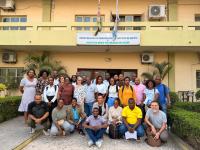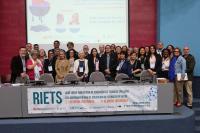World Cancer Day 2016: We can, I can

PAHO is uniting with the global cancer community to commemorate on February 4th, World Cancer Day with the slogan ‘’We can. I can’’. We seek to promote how everyone – as a collective or as individuals – can do their part to reduce the burden of cancer.
Cancer is a growing problem in the Americas and worldwide for several reasons, chief among them aging populations and changing lifestyles that increase the prevalence of risk factors.
Knowledge about the causes of cancer, and interventions to prevent and manage the disease is extensive. Cancer can be reduced and controlled by implementing evidence-based strategies for cancer prevention, early detection of cancer and management of patients with cancer. Many cancers have a high chance of cure if detected early and treated adequately.
Modifiable risk factors
It is estimated that 30–40 percent of cancers can be prevented by reducing risk factors. Public health policies can be put in place to support individual healthy lifestyle choices, and that make them the easy choice. Many other cancer types can be detected early and treated effectively through organized screening and early detection programs, and access to timely cancer treatment.
Cancer situation in the Americas
Cancer is the second leading cause of death in the Americas, where there are an estimated 2.8 million people newly diagnosed each year and 1.3 million people are dying from the disease each year. Approximately 52% of new cancer cases and 35% of cancer deaths are in people 65 years of age and younger, in the prime of their lives. If no further action is taken, the cancer situation is projected to increase to over 4 million new cancer cases and 1.9 million cancer deaths by the year 2025.
The leading cancer types in the region are lung, prostate and colorectal cancers for men, and breast, lung and cervical cancer for women.
A joint effort
The World Cancer Day 2016 campaign calls for joint efforts between governments, nongovernmental organizations and civil society organizations to promote action and investments in areas including tobacco control, promotion of healthy lifestyles, cancer screening and early detection, and improved cancer treatment services, as well as palliative care when cure is not possible.
PAHO/WHO is working with Ministries of Health in Latin America and the Caribbean to prevent cancer, detect it early and improve treatment and palliative care, through the Regional Plan of Action for the Prevention and Control of Noncommunicable Diseases. Chief among the interventions promoted are reducing the use of tobacco and alcohol; supporting the introduction of HPV vaccines and HPV DNA testing for improved cervical cancer prevention programs; improving the quality and access to early diagnosis of breast cancer; improving the quality of radiological health services, and access to affordable and essential chemotherapy drugs for cancer treatment; and expanding access to palliative care programs and opioids for pain relief and symptom management.
Together we can reduce the cancer burden in the Americas.



